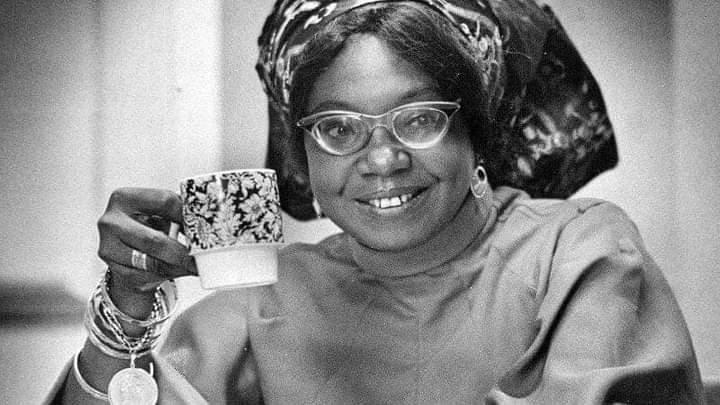Florence Nwanzuruahu Nkiru Nwapa, widely regarded as the mother of modern African literature. Accompanied by two black-and-white photographs—one showing Nwapa smiling warmly while holding a patterned cup, and another capturing her in a more reflective pose—the post celebrated her groundbreaking contributions.
Nwapa, an Igbo author born on January 13, 1931, in Oguta, Nigeria, left an indelible mark on African literature as the first African woman novelist to be published in the English language in Britain. Her debut novel, Efuru, published in 1966 by Heinemann Educational Books, not only launched her international career but also paved the way for generations of African women writers.
A Trailblazer in African Literature
Flora Nwapa’s journey to literary stardom began in her hometown of Oguta, where she attended primary school before continuing her education in Port Harcourt and Lagos. She later pursued higher education at University College Ibadan, graduating in 1957 at the age of 26, and earned a Diploma in Education from Edinburgh University in 1958.
Her academic achievements were impressive, but it was her literary talent that would cement her legacy. After completing her first manuscript, Nwapa sent it to Chinua Achebe, a towering figure in African literature. Achebe, recognizing her potential, not only encouraged her but also provided financial support to send the manuscript to Heinemann Publishers in London. The result was Efuru, a novel that would become a cornerstone of African literature.
Published as number 26 in Heinemann’s African Writers Series, Efuru was a groundbreaking work. It tells the story of an Igbo woman navigating life in a small village in colonial West Africa, exploring themes of marriage, motherhood, and independence. The novel’s focus on an Igbo woman’s perspective was revolutionary at a time when African literature was largely dominated by male voices. Critics like Naana Banyiwe-Horne have praised Nwapa’s use of dialogue, noting that “the constant banter of women reveals character as much as it paints a comprehensive, credible, social canvas against which Efuru’s life can be assessed.” Through this dialogic style, Nwapa offered an authentic portrayal of Igbo women’s lives, challenging the stereotypical narratives often perpetuated by male authors.
A Voice for Igbo Women
Nwapa’s work was deeply rooted in her Igbo heritage, and she used her platform to recreate Igbo life and customs from a woman’s viewpoint. Efuru is based on an old folktale about a woman chosen by the gods, blending cultural traditions with a nuanced exploration of gender roles.
The protagonist, Efuru, is an independent-minded woman respected for her trading ability, yet she grapples with societal expectations around motherhood—a recurring theme in Nwapa’s oeuvre. Her subsequent novels, such as Idu (1970), One Is Enough (1981), and Women Are Different (1986), continued to center women’s experiences in modern Nigerian society, addressing issues like widowhood and childlessness that African women often faced.
Although Nwapa never considered herself a feminist, her work has been celebrated for its advocacy of women’s rights. She used her female characters to challenge unfair cultural practices, offering a counter-narrative to the male-dominated literary space of her time.
As noted in a 2021 article by DW, Nwapa’s novels sought to “change the narrative of male African authors whose works were full of stereotypes about the African woman.” Kenyan author Grace Ogot, in a 1966 review, lauded Efuru for its vivid portrayal of the woman’s world, giving only “peripheral treatment to the affairs of men.”
However, not all responses were positive—some male Nigerian writers, including Eldred Jones and Eustace Palmer, criticized Nwapa for her focus on women’s issues, reflecting the gendered tensions within African literary circles at the time.
A Life of Service and Influence
Beyond her literary contributions, Nwapa led a multifaceted career in education and public service. After returning to Nigeria, she worked as an Education Officer in Calabar and later taught English and Geography at Queen’s School in Enugu from 1959 to 1962. She held various positions, including Assistant Registrar at the University of Lagos (1962–1967), and served as Minister of Health and Social Welfare in East Central State (1970–1971) and Minister of Lands, Survey, and Urban Development (1971–1974) following the Nigerian Civil War. Later in her career, she became a visiting lecturer at Alvan Ikoku College of Education in Owerri and a visiting professor of creative writing at the University of Maiduguri in 1989.
Nwapa’s influence extended beyond her lifetime. She passed away on October 16, 1993, in Enugu, but her legacy endures through the generations of African women writers she inspired, including figures like Buchi Emecheta and Chimamanda Ngozi Adichie. Her work set the stage for contemporary Nigerian female authors who continue to explore and challenge the negative narratives surrounding African women.
A Lasting Cultural and Feminist Legacy
The black-and-white photographs shared in the X post offer a glimpse into Nwapa’s era and cultural context. In one image, she is seen wearing traditional attire, including a headscarf and large earrings, holding a patterned cup with a warm smile—an image that reflects the warmth and authenticity of her storytelling. The other photo captures her in a more contemplative mood, perhaps hinting at the depth of thought she brought to her writing. These images, paired with Maazị Ogbonnaya Okoro’s tribute, remind us of Nwapa’s role as a cultural icon who bridged tradition and modernity.
Flora Nwapa’s contributions to literature and society are profound. Through Efuru and her subsequent works, she gave voice to Igbo women, challenging societal norms and paving the way for a more inclusive African literary canon. Her inclusion in Heinemann’s African Writers Series, which published 359 books between 1962 and 2003 and featured luminaries like Chinua Achebe and Wole Soyinka, underscores her global impact. As the X post and its replies reveal, Nwapa’s work continues to resonate with readers—many of whom fondly recall reading Efuru and her other novels, such as Never Again, which reflects on the Biafran Civil War.
In celebrating Flora Nwapa, we honor not only a literary pioneer but also a woman who redefined the narrative of African womanhood. Her legacy is a testament to the power of storytelling to challenge, inspire, and transform. As Maazị Ogbonnaya Okoro’s post reminds us, Nwapa’s smile—both in her photograph and in the lives she touched through her words—continues to shine brightly in the world of African literature.

